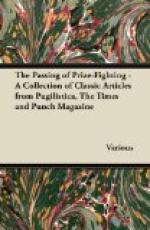* * * * *
THEIR “IBSEN-DIXIT.”
A new set of Faddists has been gradually growing up, not in our midst, but in the parts about Literature and the Drama. The object of their cult is, one HENRIK IBSEN, a Norwegian Dramatist, (perhaps it would be more correct to say, the Norwegian Dramatist,) of whose plays a pretty sprinkling of scribes, amateur and professional, but all of the very highest culture, profess themselves the uncompromisingly enthusiastic admirers. You may not know the Ibsenites or any of their works, but in their company at least,—that is, supposing yourself so highly privileged as to be admitted within the innermost circle of the Inner Ibsen Brotherhood,—not to know IBSEN would be proof positive of your being in the outer darkness of ignorance, and in need, however unworthy, of the grace of Ibsenitish enlightenment. Recruits are wanted in the Ibsenite ranks, so as to strengthen numerically the one party against the other; for the Ibsenitish sect has so for progressed as to be at loggerheads amongst themselves; not indeed on any really essential question, such as would be, for example, any doubt as to the position of IBSEN as a Dramatist, or as to the order of merit and precedence to be assigned to his works. No, on such matters they are apparently at one; but in other matters they are at one another. Thus the unity appears to be only superficial, a decent plaster hiding the rift occasioned by one of their number having literally translated into English IBSEN’s latest Norwegian drama, of which translation the verbal correctness is impugned by another learned Ibsenite.
Not being “a hardy Norseman,” and having neither a reading nor speaking acquaintance with the Norse language, I am unable to decide abstruse points on which such learned doctors disagree; but not being altogether without some practical experience of English and French drama, I venture to call in question not only the dramatic ability of the dramatist himself, but also, after perhaps allowing him some merit as a type-writer or character-sketcher, to assert that the style and matter of most of his work is always tiresome, frequently childish, and the subject often morbid and unhealthy; and, further, that his method is tedious to the last degree of boredom; for, as a writer, if I may judge him fairly by his translators, he is didactic and prosy, and never more tedious than when his dialogue is intended to be at its very crispest. As a playwright his construction is faulty. Here and there he gives expression to pretty ideas, reminding me (still judging by the translation) of TOM ROBERTSON, not when the latter was in his happiest vein, but when laboriously striving to make his puppets talk in a sweetly ingenuous manner.




